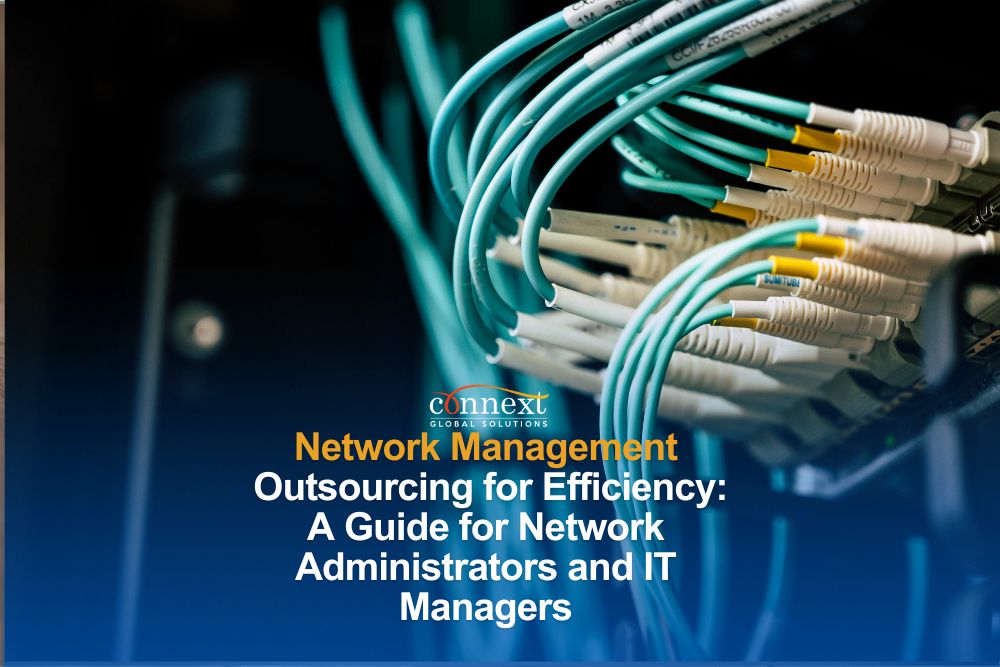Introduction
In today’s rapidly evolving technological landscape, the demands placed on internal IT teams for managing network infrastructure have become increasingly complex. The rise in the number of users, devices, and security threats has made it challenging for in-house teams to keep pace with the ever-growing demands. Thankfully, network management outsourcing has emerged as a strategic solution for many organizations seeking to improve efficiency.

Photo by Brett Sayles
This guide will explore the benefits of outsourcing network management and how it can empower IT managers and network administrators to achieve:
- Enhanced network reliability and performance
- Cost savings in IT operations
- Stronger network security posture
- Increased focus on core business functions
The challenges faced by in-house network administrators and IT managers
The ever-expanding demands placed on modern networks pose a significant challenge for internal IT teams. The sheer number of users, devices, and applications accessing the network creates a constant struggle to maintain optimal performance. Imagine a highway designed for a small town suddenly forced to handle the traffic of a major metropolis — that’s the pressure in-house network administrators face.
Further compounding the issue is the juggling act IT teams must perform. Beyond network maintenance, they’re tasked with troubleshooting user issues, providing ongoing support, and all the while, staying abreast of the latest technological advancements. It’s a relentless cycle that can leave even the most skilled teams feeling stretched thin.
This constant pressure can lead to a critical gap: the lack of specialized expertise needed to address advanced network issues. While an internal team might excel at daily maintenance, complex problems may require skills not readily available in-house. This can significantly delay resolution and leave the network vulnerable during critical situations.
The consequences of these challenges are far-reaching. Network downtime and performance issues can cripple business operations, leading to lost productivity and frustrated employees. Security breaches become a heightened concern when stretched teams struggle to keep pace with the evolving tactics of cybercriminals. Ultimately, the inability to adapt to ever-changing technologies can stifle innovation and hinder a company’s ability to compete in the digital age.
By acknowledging these challenges, organizations can make informed decisions about how best to manage their networks.
Advantages of network management outsourcing
Network management outsourcing offers a strategic solution to address the challenges faced by internal IT teams. By partnering with a BPO (Business Process Outsourcing) vendor that offers network management services, organizations can gain access to a team of specialists with the expertise and resources to optimize network performance and security. Here we list the key benefits:
Improved network reliability and performance
Network management outsourcing offers a significant boost to network reliability and performance. By implementing 24/7 proactive monitoring, BPO firms that offer network management outsourcing, also known as managed service providers (MSPs) can identify and address potential issues before they escalate into major disruptions. Their expertise and resources also translate to faster incident resolution, minimizing downtime and ensuring business continuity. Moreover, MSPs leverage advanced tools specifically designed for network optimization, allowing them to identify bottlenecks and fine-tune your network for peak performance and a seamless user experience.
Cost savings
Don’t let network management become a financial burden. Outsourcing delivers a guaranteed ROI and significant cost savings down the line. With outsourcing, organizations would no longer need a dedicated internal network management team, leading to significant savings on salaries, benefits, and overheads. Additionally, outsourcing eliminates the upfront capital expenditure for acquiring the latest network management tools, as MSPs provide access to their advanced infrastructure through a predictable subscription fee. This fixed-cost approach offers greater financial stability and budgeting control. Finally, economies of scale allow MSPs to leverage their expertise across multiple clients, delivering cost-effective services that might be difficult for a single organization to achieve on its own.
Enhanced security
Network management outsourcing strengthens an organization’s security system in several ways. MSPs are at the forefront of cybersecurity best practices, implementing robust security protocols like firewalls, intrusion detection systems, and data encryption to safeguard your network. Furthermore, they possess the expertise to navigate the complex world of data security regulations, ensuring your organization remains compliant with industry standards. Most importantly, their continuous monitoring allows for proactive threat detection and mitigation, neutralizing potential security breaches before they can cause harm.
Increased focus on core business functions
Outsourcing network management yields significant benefits beyond just technical expertise. It frees up valuable internal IT resources, allowing them to shift their focus from network maintenance to core business initiatives that directly drive growth and innovation. This newfound freedom empowers them to explore and implement innovative technologies, fostering the development of creative solutions to optimize business processes. Ultimately, a reliable and well-maintained network, facilitated by outsourcing, translates to streamlined operations and improved employee productivity across the organization.
Selecting the right network management provider
Choosing the right network management partner is crucial for maximizing the benefits of outsourcing. Prioritize experience and certifications; look for an MSP with a proven track record and relevant network management qualifications. Solid service-level agreements are essential — these agreements should clearly define performance expectations, response times, and service-level guarantees. Finally, ensure the MSP’s security protocols and disaster recovery plans align with your organization’s needs. This comprehensive evaluation process will ensure you select a partner who can deliver the best possible service for your specific requirements.
Maintaining internal control and communication
Once you find a partner, the next thing to do is to focus on building a collaborative working relationship with your chosen service provider. A successful outsourcing partnership hinges on clear communication and control measures. Establish open communication channels with the MSP to foster collaboration and efficient problem-solving. Likewise, make sure to define clear internal reporting procedures for network performance, ensuring your team stays informed and maintains oversight. Finally, implement robust access control measures to safeguard sensitive data and network resources, even when working with a trusted partner. This balance between collaboration and control allows you to leverage the expertise of an MSP while maintaining responsibility for your critical network environment.
Conclusion
Network management outsourcing transcends mere efficiency gains — it’s a strategic investment that empowers businesses to excel in today’s digital landscape. Partnering with a qualified MSP unlocks a wealth of benefits, including enhanced network reliability, optimized costs, robust security, and the freedom for internal IT teams to focus on core business initiatives. Ultimately, outsourcing empowers IT leaders to become strategic drivers of growth, while ensuring a secure and reliable network foundation for the entire organization.
Take control of your IT future — explore the possibilities of network management outsourcing and unlock the full potential of your network by contacting Connext today!
Follow us on:
Facebook: Connext
LinkedIn: Connext
Instagram: @connextglobalsolutions_
Twitter: @ConnextPh








